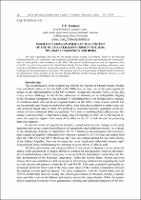Показать сокращенную информацию
Germany's Foreign Policy in the Context of the Multilateralism Crisis in the 2010s: the Main Challengts and Risks
| dc.contributor.author | Froltsov, V. V. | |
| dc.date.accessioned | 2020-09-23T13:00:43Z | |
| dc.date.available | 2020-09-23T13:00:43Z | |
| dc.date.issued | 2019 | |
| dc.identifier.citation | Froltsov, V. V. Germany's Foreign Policy in the Context of the Multilateralism Crisis in the 2010s: the Main Challengts and Risks / V. V. Froltsov // Веснiк Брэсцкага унiверсiтэта. Серыя 2, Гiсторыя, Эканомiка, Права. – 2019. – № 1. – С. 20–29. | ru_RU |
| dc.identifier.issn | 2218-0281 | |
| dc.identifier.uri | http://rep.brsu.by:80/handle/123456789/1110 | |
| dc.description.abstract | The main challenges and risks for the foreign policy strategy of Germany, based on the principle of multilateralism, are considered in the conditions of growing mutual distrust and intensification of contradictions in world politics and economics in the 2010s. The growth of Euroscepticism and the migration crisis in the EU, as well as the actions of the United States, Russia, Turkey, China, which, according to Germany, were one-sided and did not take into account the interests of other states, were identified among the most significant problems for the foreign policy of Germany. The measures taken by the government of Angela Merkel to improve the effectiveness of the activities of the German Foreign Ministry and the Federal Intelligence Service, as well as the modernization of the Bundeswehr are identified. | ru_RU |
| dc.language.iso | en | ru_RU |
| dc.publisher | BrSU named after A.S. Pushki | ru_RU |
| dc.relation.ispartofseries | Series 2. History. Economics. Law; | |
| dc.title | Germany's Foreign Policy in the Context of the Multilateralism Crisis in the 2010s: the Main Challengts and Risks | ru_RU |
| dc.title.alternative | Внешняя политика Германии в условиях кризиса мультилатерализма в 2010-е гг.: основные вызовы и риски | ru_RU |
| dc.type | Article | ru_RU |
